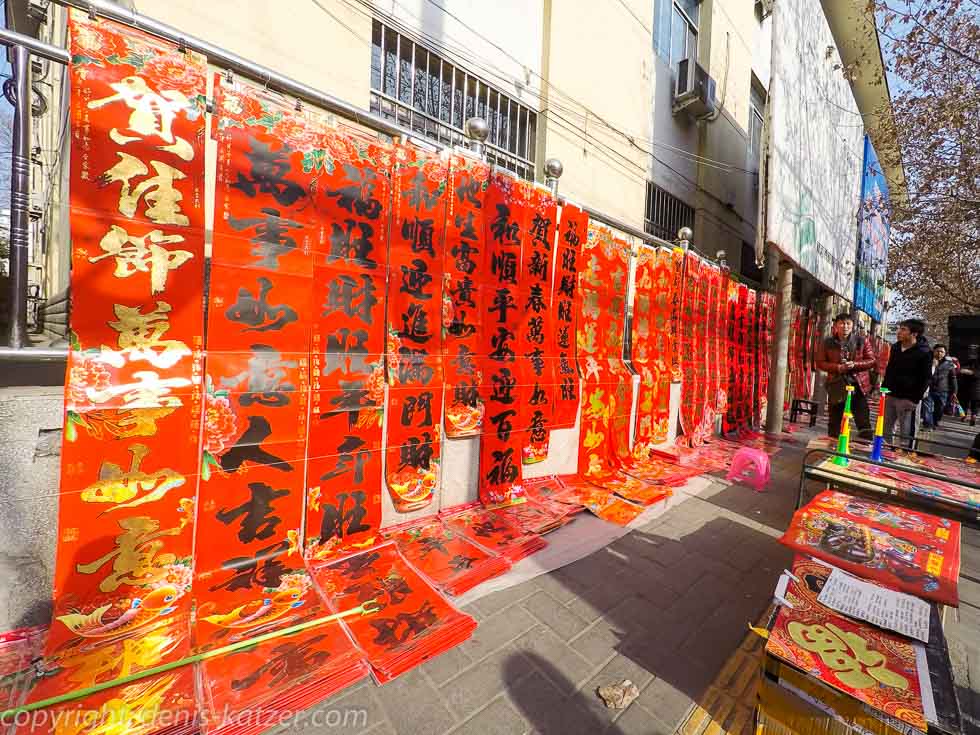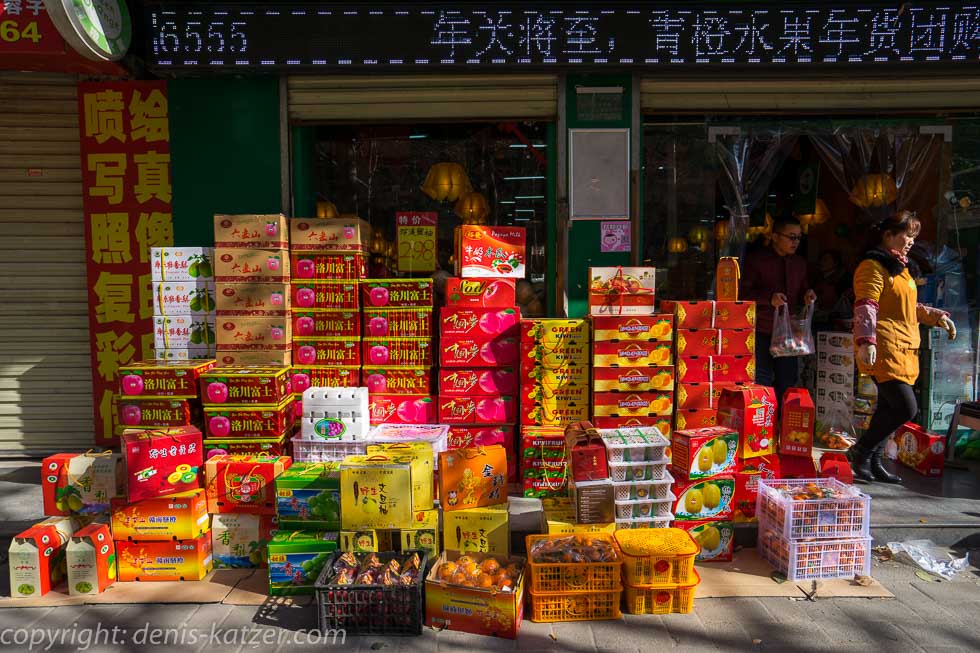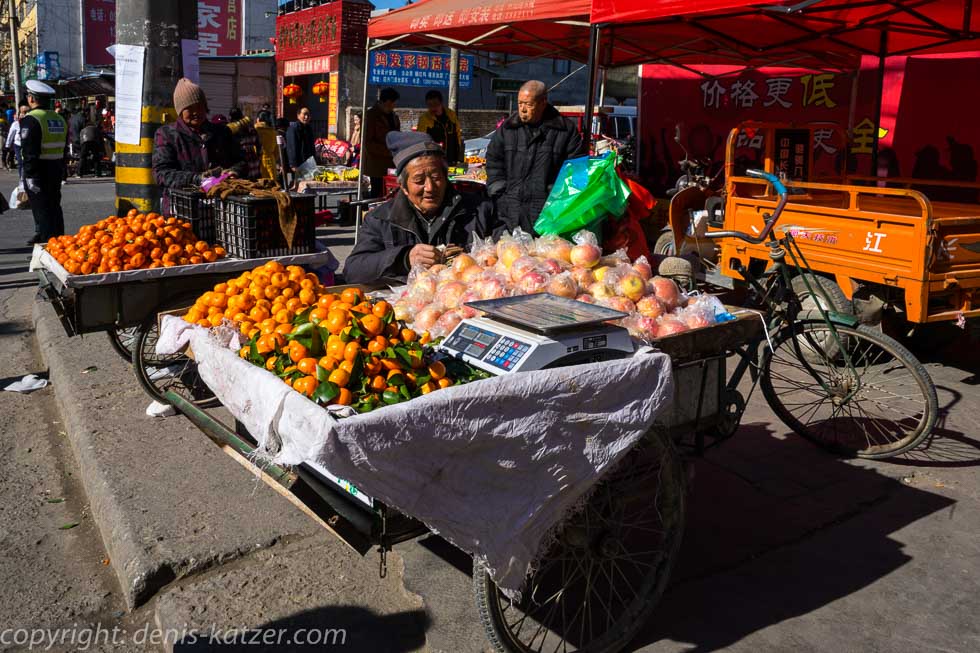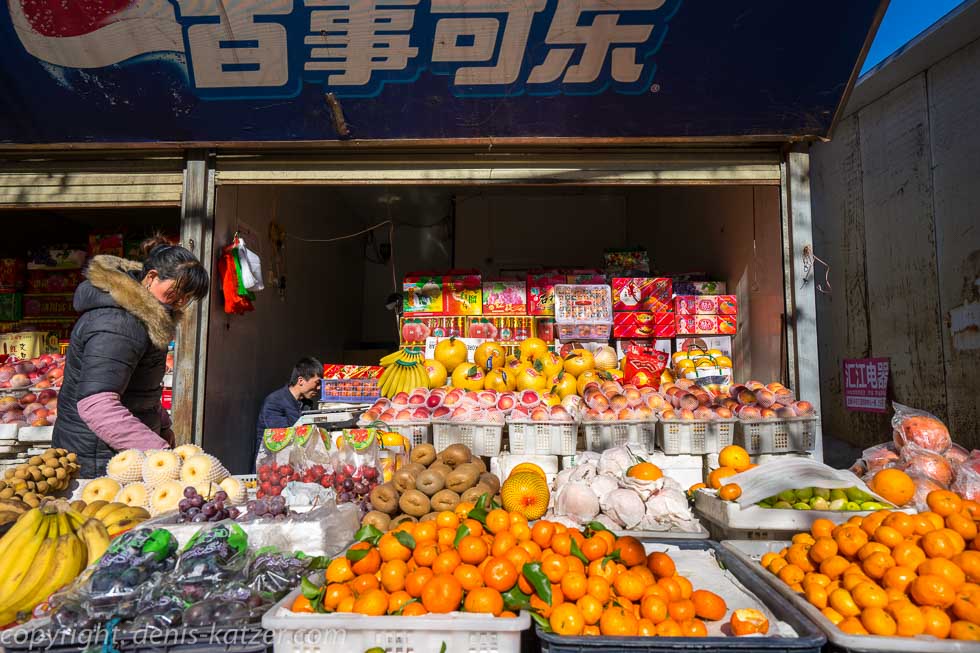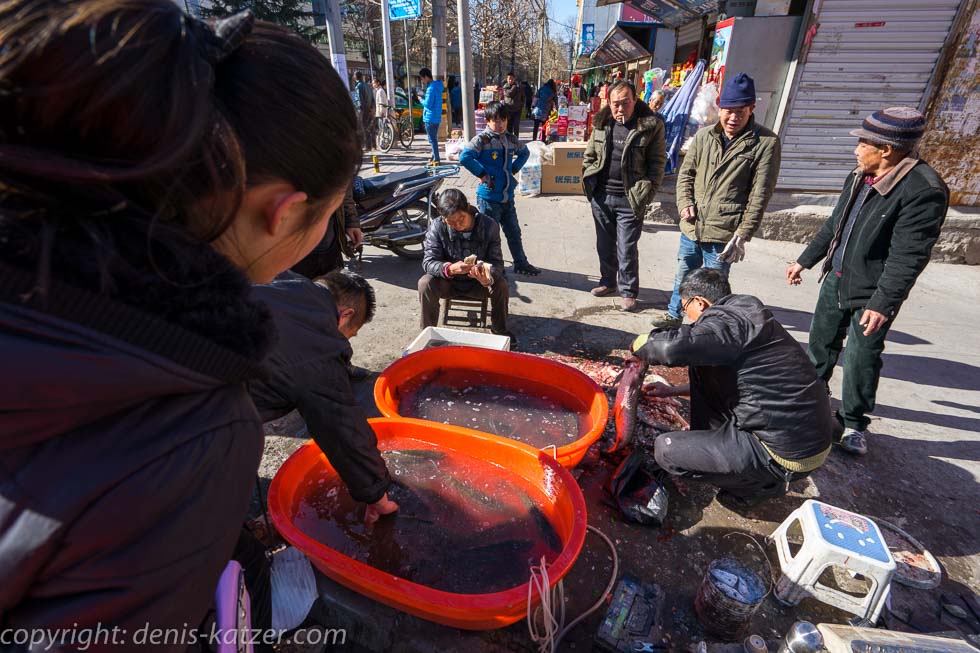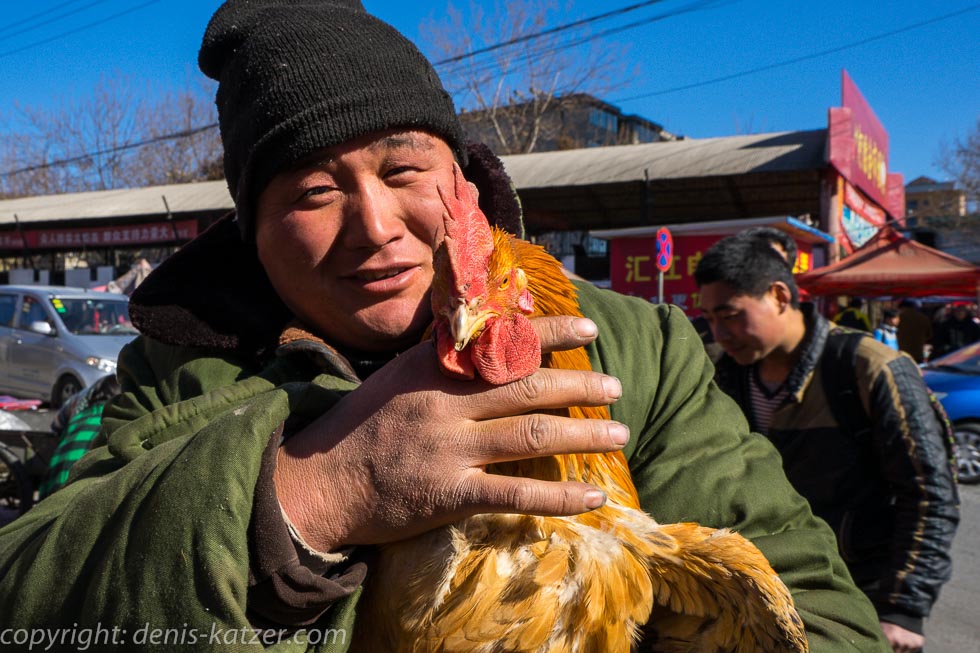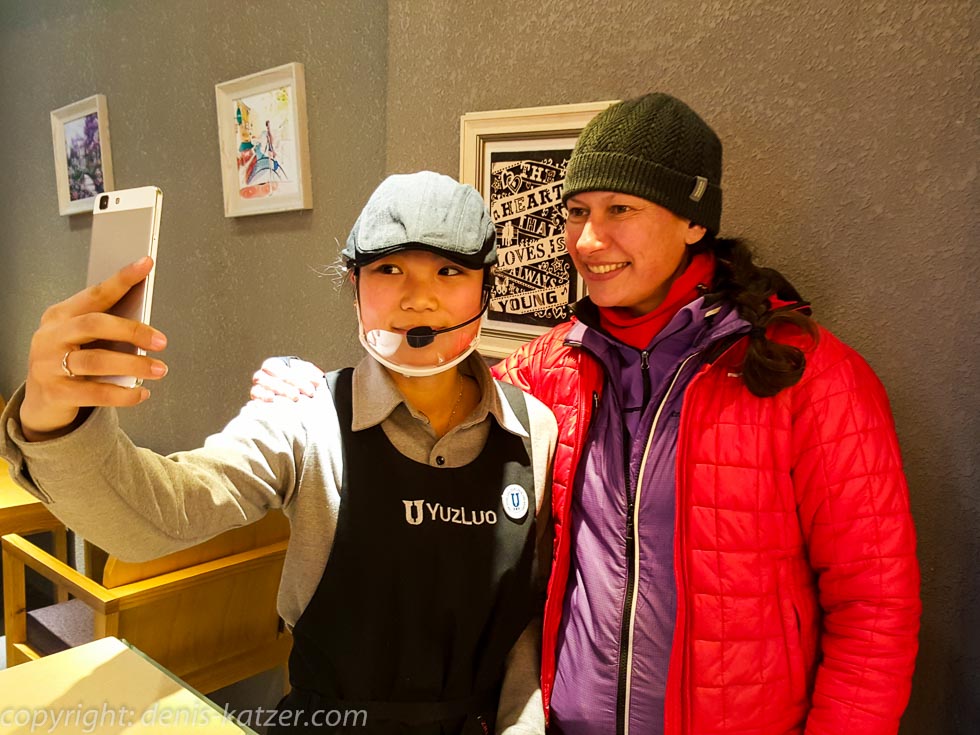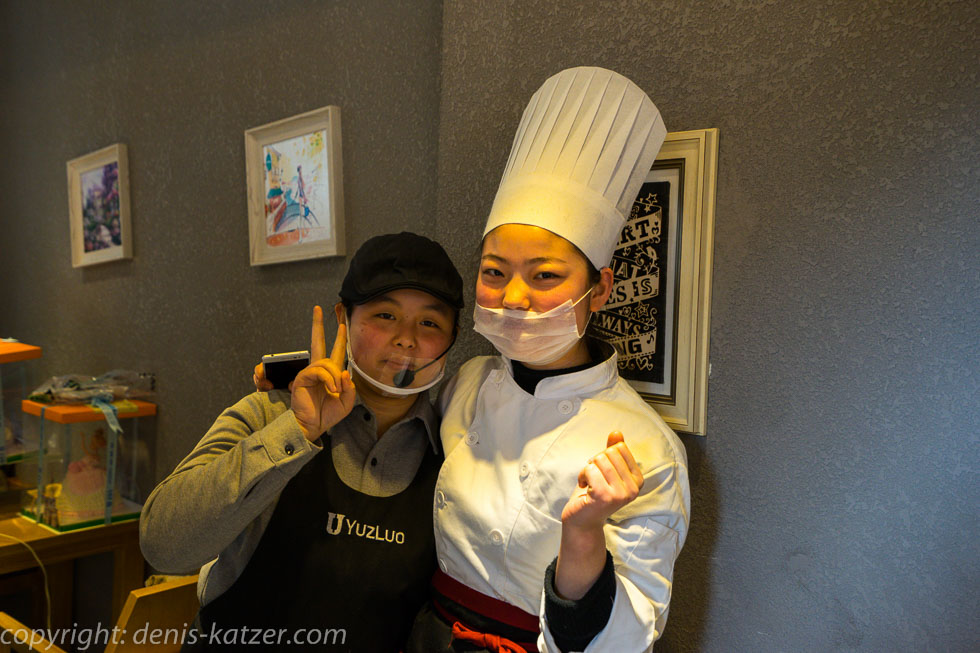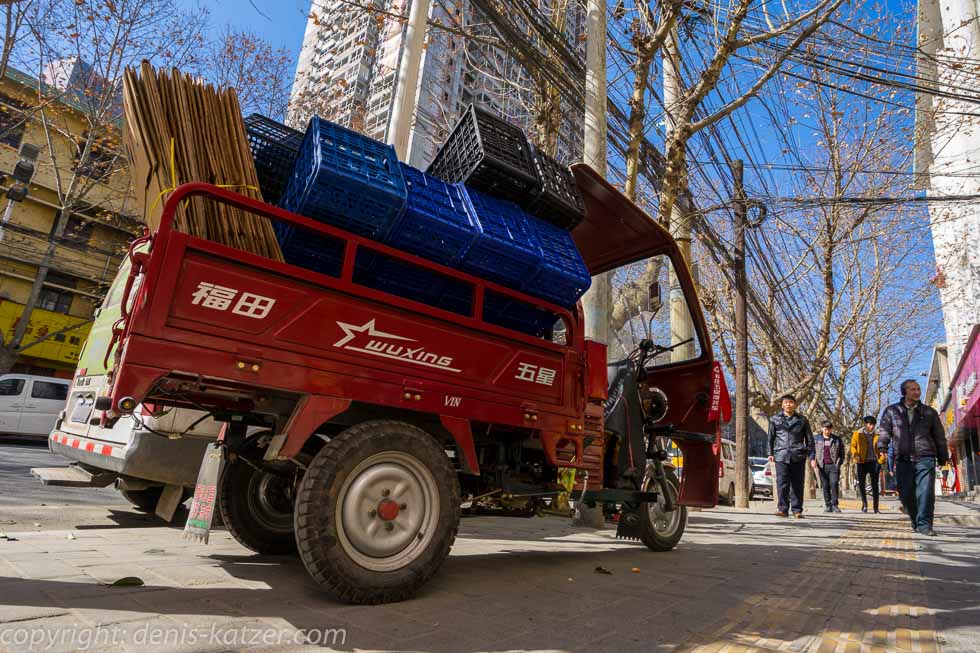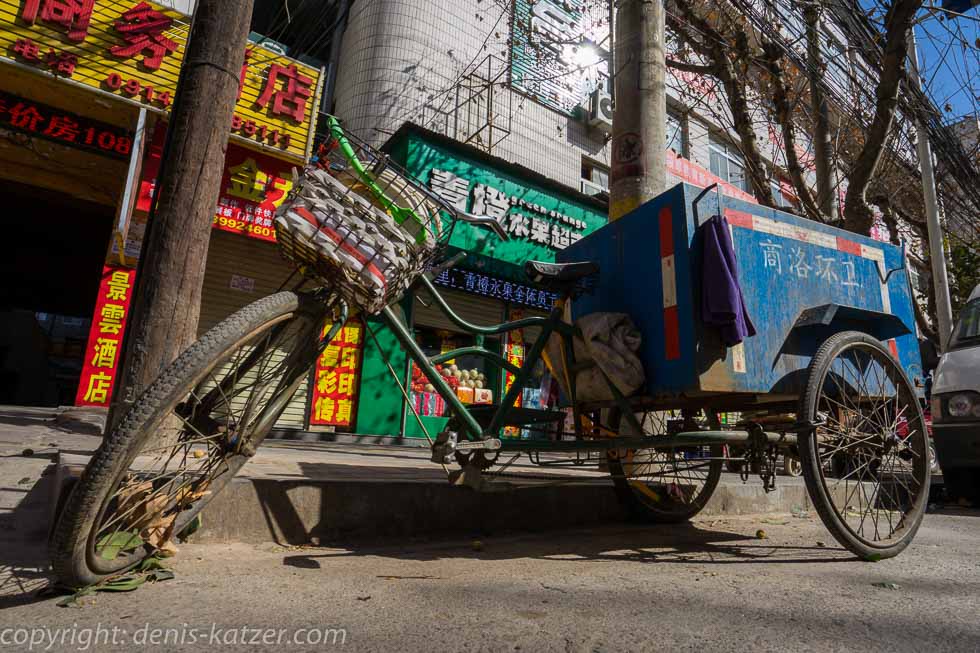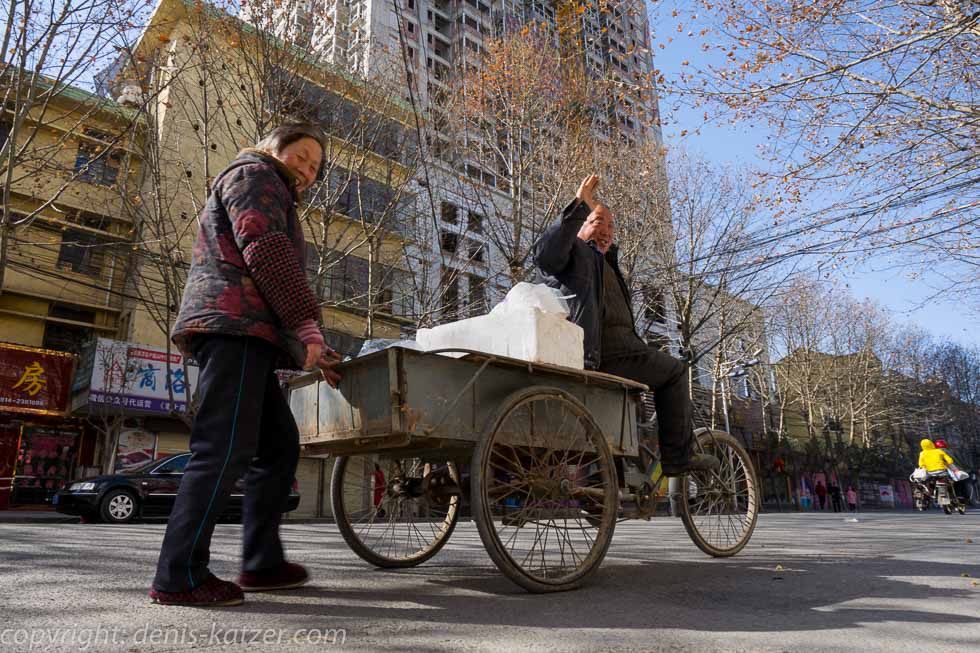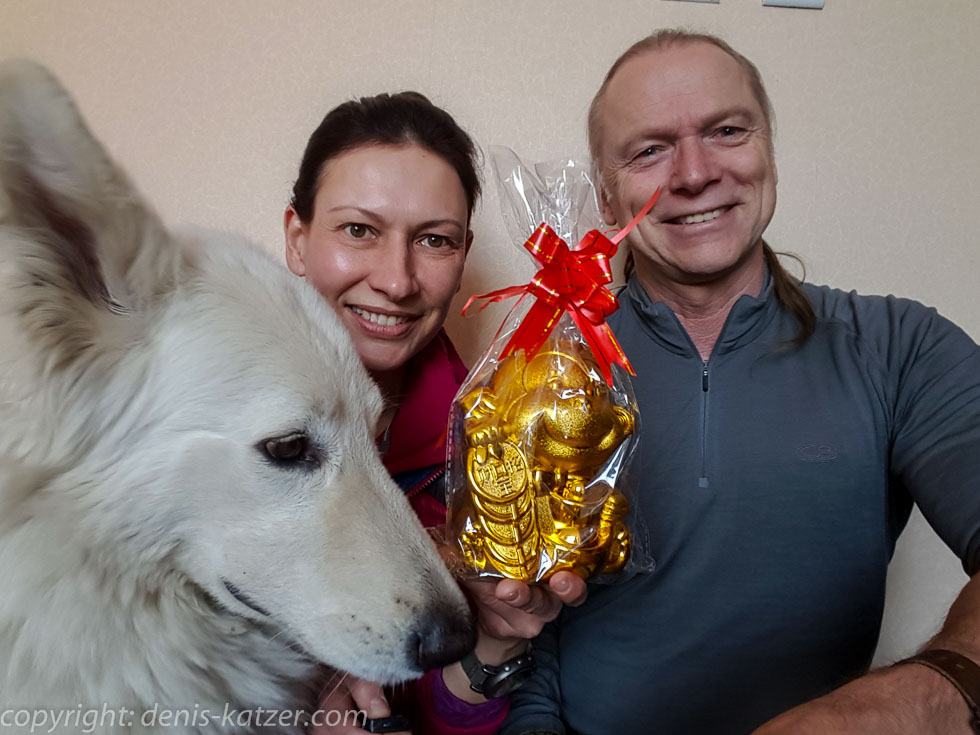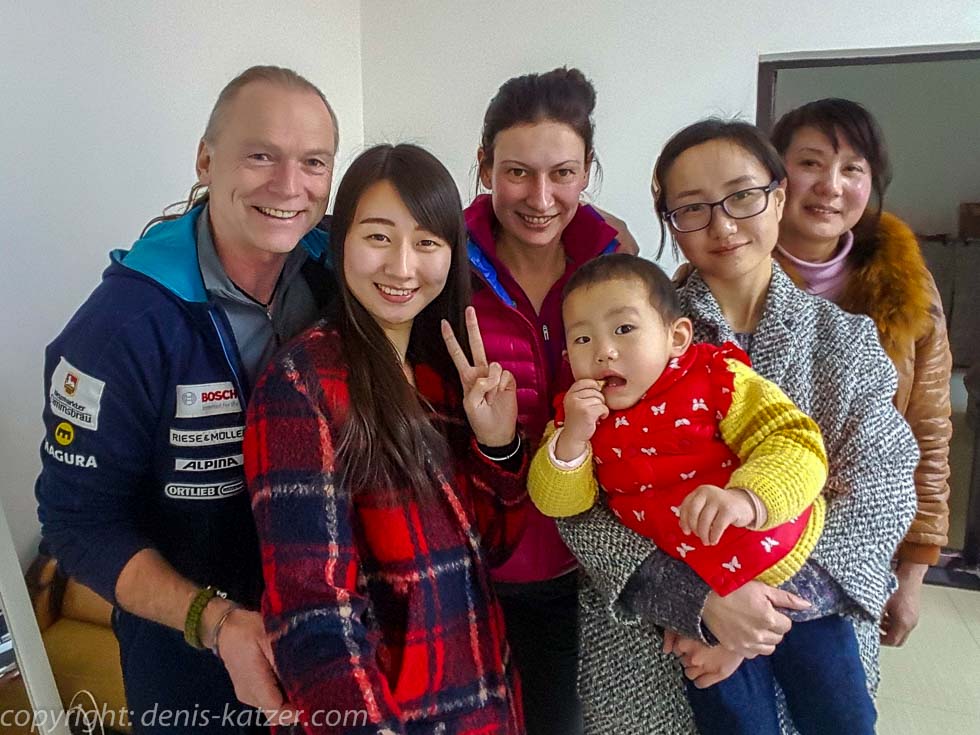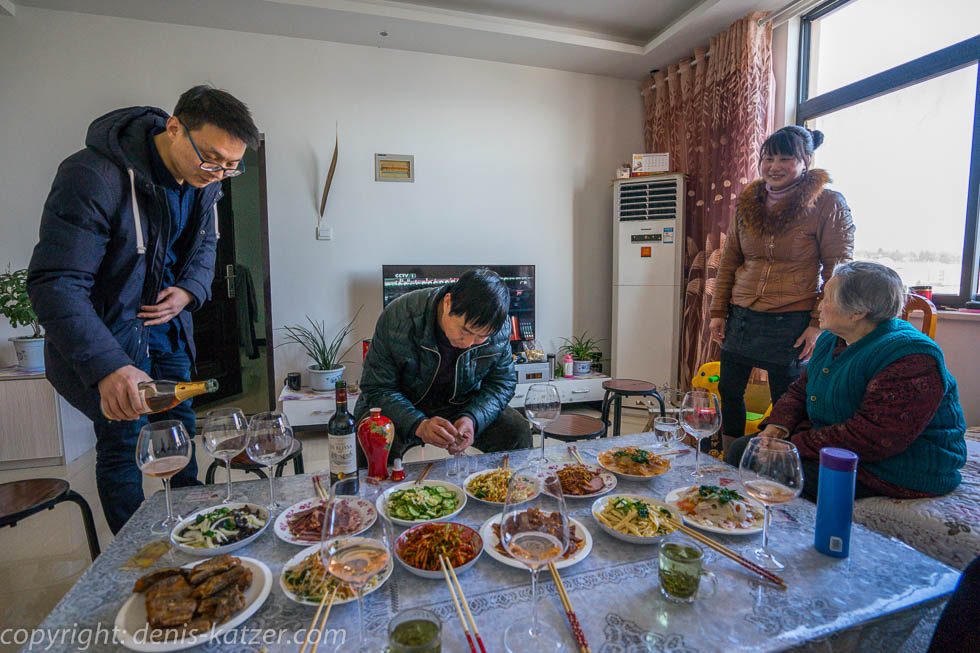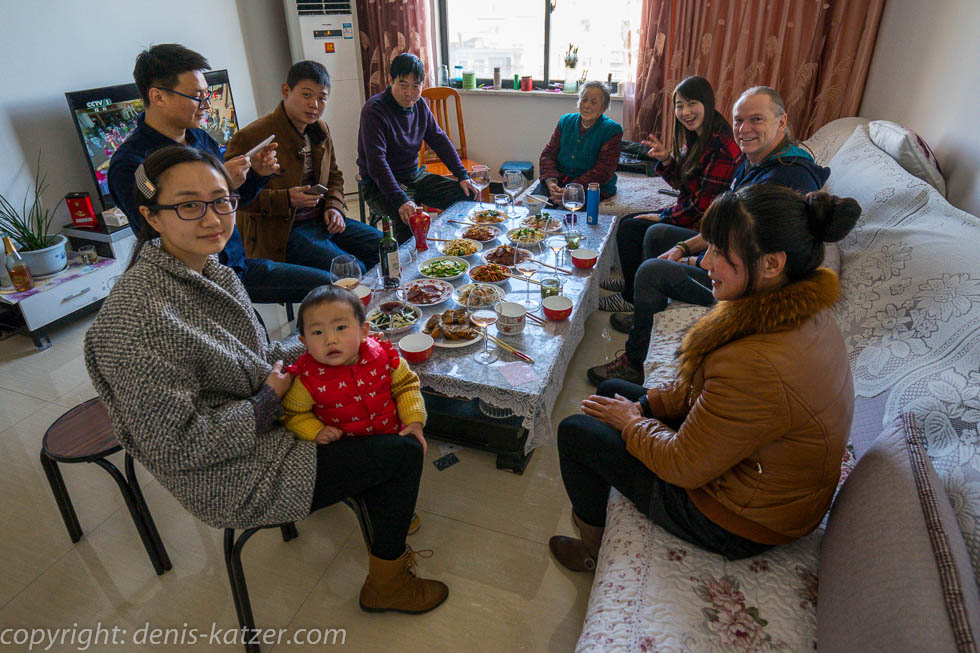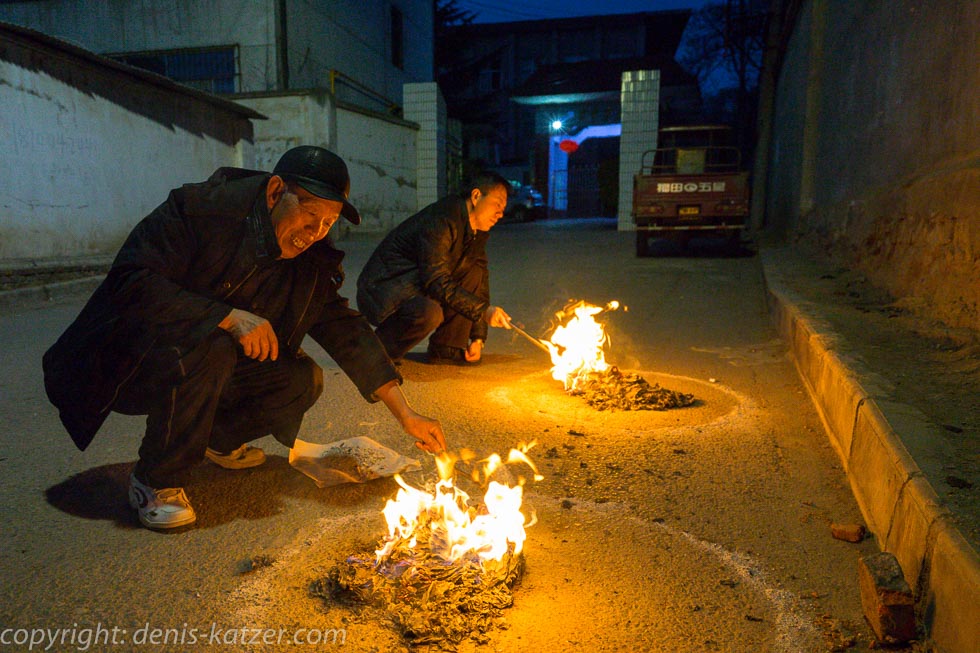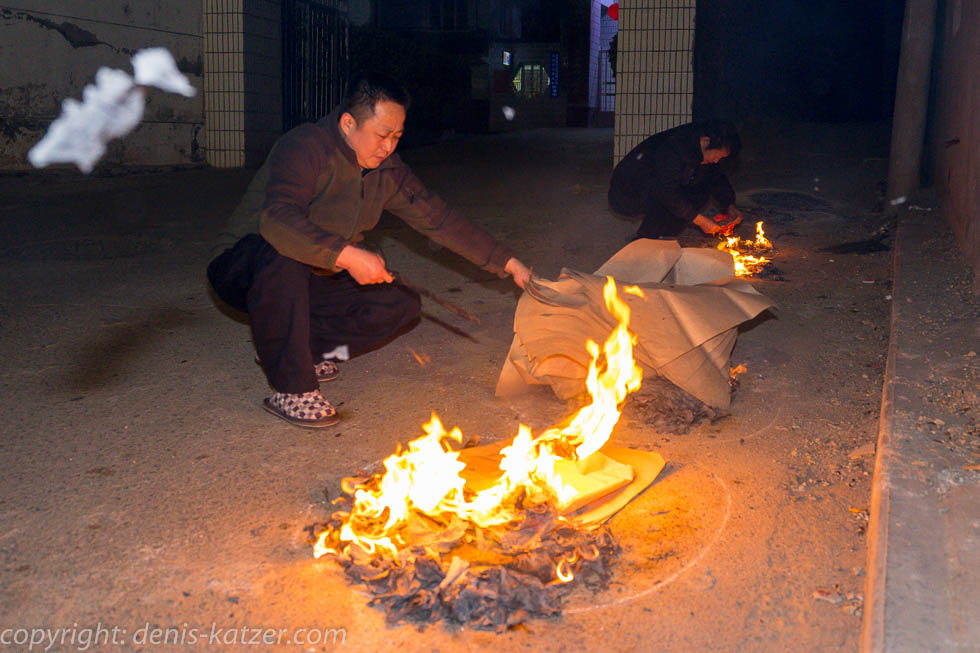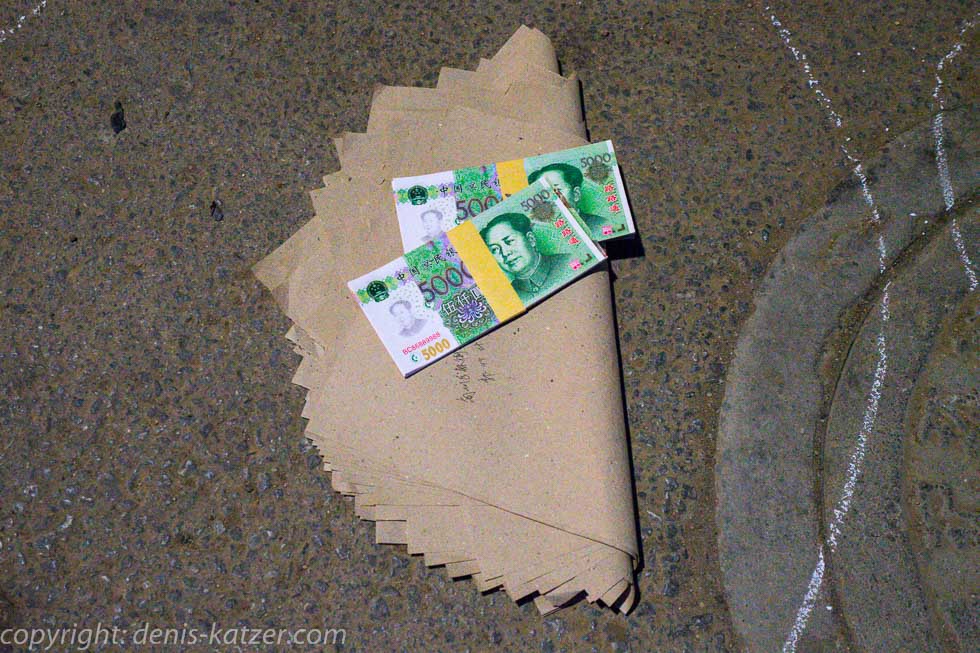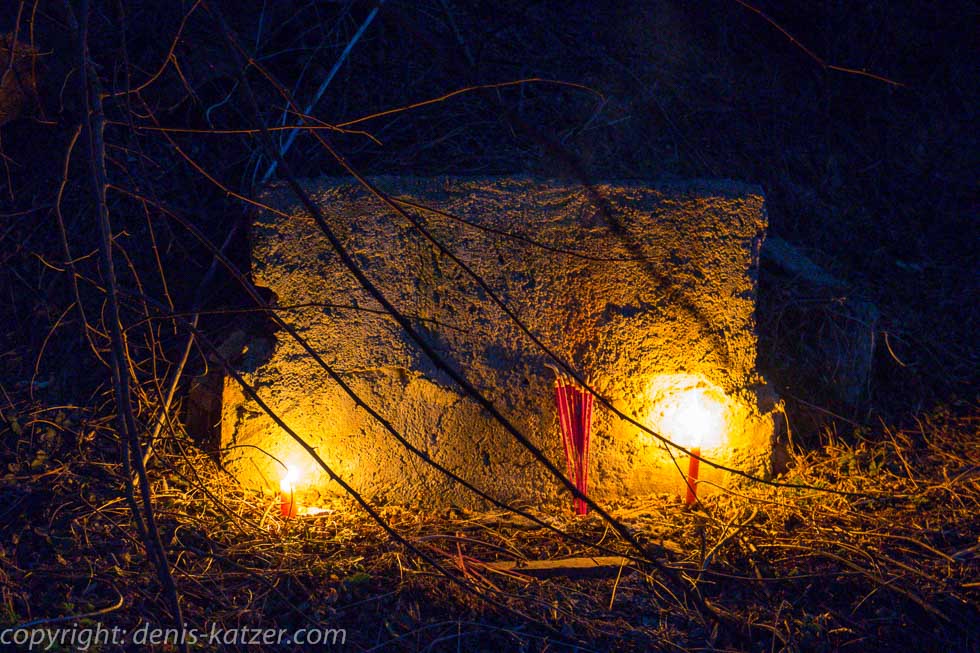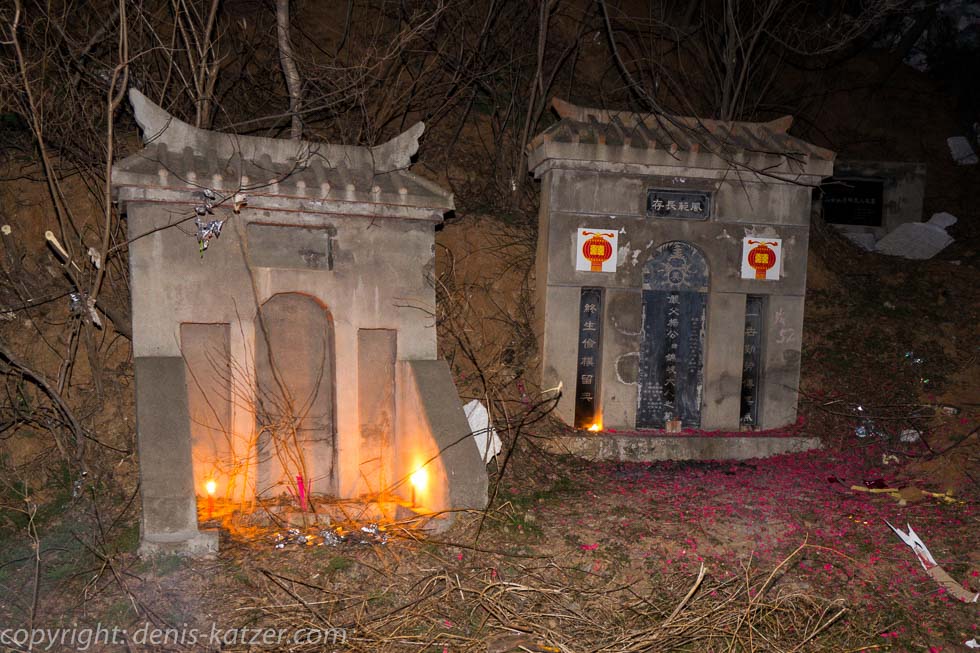
Chinese New Year – banishing the demons
N 33°52'33.8'' E 109°55'27.7''
Date:
07.02.2016
Day: 223
Country:
China
Province:
Shaanxi
Location:
Shangluo
Latitude N:
33°52’33.8”
Longitude E:
109°55’27.7”
Total kilometers:
11,835 km
Maximum height:
542 m
Total altitude meters:
15.830 m
Sunrise:
07:33 am
Sunset:
6:14 pm
Temperature day max:
6°C
Temperature day min:
minus 10°C
(Photos of the diary entry can be found at the end of the text).
On the last day of the Chinese Year of the Goat, preparations for the Great Spring Festival or Chinese New Year are in full swing. The date is different every year because it is calculated according to the traditional Chinese lunisolar calendar (luna for moon and solar for sun). For the Chinese, New Year’s Day is the most important holiday of the year. It is the beginning of a seemingly endless celebration that only ends on the 15th day of the new year, putting the huge country into a state of emergency, at least for the first three days. We learn that the festival of festivals is not only celebrated excessively here in China, but also in Korea, Mongolia, Okinawa, Taiwan, Vietnam and in regions around the world where many overseas Chinese live. These include Singapore, Malaysia, Indonesia, the Philippines and parts of overseas.
While the Chinese are still busy making preparations for the celebrations, we are experiencing the so-called ideal state. Since we don’t have much to do with this festival, we can enjoy the hustle and bustle around us as mere observers. Because we expect that our long-awaited parcel won’t arrive, also or perhaps because of the holidays, we leave our accommodation and visit the great café, which serves delicious cakes and cappuccino. On the way there, most of the stores have already closed. In front of the entrances and next to the windows of the houses and apartments hang red lanterns and red paper ribbons on which are written in black letters all kinds of blessings for happiness, joy and prosperity.
For weeks now, people have been busy dressing up their possessions for the festivities. The color red has accompanied us throughout our trip to China. It plays another special role these days. According to legend, a year demon terrorized a settlement every New Year’s Day. With a lot of noise, red paint and red lanterns, the villagers drove away the demon, which was obviously allergic to red.
Although it is only early in the morning, fireworks are being set off more and more often. It seems as if people are already warming up. It also gives the impression that the population here has fallen into a total consumer frenzy, just like here at Christmas. They scurry back and forth to buy what they need in the stores that are rarely open. Cars are crammed full and mopeds and bicycles are loaded to such an extent that only the tires are visible under the mountain of often red boxes. “A crazy hustle and bustle,” I say with a grin, glad that I don’t have to run around like a hunted chicken either. “Ni hao! Ni hao!”, we greet the owners of small stores that we have made friends with over the last two weeks. We feel as if we belong, as if we are part of this community in the immediate vicinity of our hotel. “Happy New Year!”, the café staff greet us with a friendly shout. “Happy New Year!”, we reply and place a large order to celebrate. As always in this place, we talk animatedly about our journey, its meaning, experiences and the challenge of documenting it in text, pictures and film. “It’s strange that we’ve been held up in this city for so long again and we’re busy every day,” I muse. “Yes, we could just move our office to the hotel room,” Tanja replies. “Katzer office in Shangluo, Shaanxi province. Sounds kind of interesting,” I say with a laugh. Sure, we could get really upset about our missing spare part, but what’s the point? What use is it to us if our hair turns gray? This will not speed anything up. On the contrary, it would ruin our lives here in this place. So we let go. The parcel arrives when it arrives. And if it doesn’t happen, we’ll think of a plan B. “There must be a reason for something,” Tanja repeats. It’s a philosophy that you can live with very well and that applies to almost everything that doesn’t work the way we humans want it to.
It is 3 p.m. when we climb the stairs to the ninth floor of our hotel. We are invited to a banquet by the hotel owner’s family. “Come in,” says Yang Xiao, the family’s 23-year-old daughter. “This is for you,” says Tanja and hands her a bag of oranges, oranges, melons, a packet of bunny sweets, which stand for good luck, and a golden plastic monkey, which, according to Chinese astrology, symbolizes the coming year of the fire monkey. “But you don’t need to bring anything with you,” says Yang Xiao, who is called Claudia by her teacher and has been studying German for three years. “It’s just a little thing. We are very grateful for your invitation to celebrate this special occasion with your family,” Tanja replies.
“This is my dad Yang Shitian, my mom Ren Fangzhen, my big brother Yang Hailong, my little brother Yang Liang and my grandma,” she introduces her little family. No sooner had she listed the foreign-sounding names than I forgot them again. While mom and dad disappear back into the kitchen for the final preparations for the feast, the brothers’ two wives and the eldest’s two-year-old daughter appear. In the meantime, it’s like all family celebrations. They laugh, talk, the little one screams, cries, wants, gets and laughs too, while the 88-year-old grandma sits more or less motionless on the sofa and watches the New Year’s program on a huge flat-screen TV. “Thank you very much for the invitation,” says Tanja again. “We were very happy to do that. You can’t be alone on this festive day,” replies Claudia. “I think that many Chinese people who work in other parts of the country are alone. Or do they come to visit their families during the holidays?” I ask. “Oh yes. Every year at this time, the largest migration movement in the world takes place. In total, almost three billion journeys home will take place this year. That means that hundreds of millions of my countrymen and women will be traveling to visit their families, no matter how far they have to travel. Many of the workers take their entire annual leave for this festival and sometimes stay at home for weeks. You have to know that family is the most important thing for us Chinese. It even goes so far that up to two thirds of them look for other jobs afterwards, which is a big challenge for employers every year.”
Not much time passes as parents and the grown-up children jump up and put 12 cold dishes on the table. Sparkling wine is served in large red wine glasses. Dad and his young brother pour me a glass of Chinese schnapps. “Gambei!” they toast me. “Gambei!” I raise my glass, clink glasses with them and pour the clear liquid down my throat. Then we start to circle our chopsticks over the large selection. As I don’t eat meat in China apart from chicken, and that only rarely, I choose from the wide range of vegetarian options. “And what are these?” I ask Claudia, biting down on something that is quite unruly when I chew “These are sliced pig’s ears.” “Pig’s ears?” “Yes.” Tanja grins at me from the side. “Do you want some of the pig’s ear salad?” I ask. “No thanks,” she laughs. I’m almost full when mom and dad serve the hot dishes. There is donkey, pork, beef, fish and also vegetarian dishes. As soon as everyone has finished eating, they get up almost abruptly. Grandma has just enough time to distribute her hongbao (gifts of money in red envelopes). The gifts of money are accepted without any apparent thanks on my part. Then, apart from Claudia, grandma and mother, everyone disappeared. It takes us a few minutes to realize that no one is coming back to sacrifice incense and fireworks to our ancestors. My older brother and his wife are now visiting my sister-in-law’s family,” Claudia explains without us having to ask. “Uh, let’s go and have a little rest,” I say to Claudia so as not to do anything wrong. “My parents have invited you to a traditional jiǎozi (stuffed dumplings) meal tomorrow morning. Are you up for it?” she asks. “Of course,” we reply and look forward to the next meeting together.
It gets louder and louder in the evening. Paper money is being burned everywhere on the streets. As far as we understand, it’s about your own financial blessing for the coming year and keeping the ancestors, powerful spirits and demons happy. It is already dusk when we climb a nearby hill. While more and more rockets are shot into the dark sky down in the small town of Shangluo, we see many fires flickering in the mountains above. After 20 minutes we reach the first graves. Relatives burn money in front of the gravestones, light candles and, we can hardly believe it, set off fireworks. It crashes and sparks so deafeningly that the dead man has to turn over in his grave. However, according to Claudia’s explanation, it is about driving away the evil spirits. According to an old legend, a monster comes out of the mountains every year to satisfy its hunger with human flesh after a deep sleep. To protect themselves from the voracious monster, the people make noise, light fires and paint everything red. Once again, the color red, to which the terrifying creature reacts terribly in combination with the fire and the noise, helps. In this way, this evil creature is driven away, which also drives away the old year and welcomes the new year.
Although it is not an earthquake or volcanic eruption, but rather a flare-up of countless firecrackers caused by people, some of them superstitious, whose explosions are more comparable to hand grenades, and the ignition of entire rocket batteries, the earth seems to go down at midnight. Within a few minutes, the entire city is shrouded in heavy smoke. In cities like Beijing and Xia’an, smog levels rise for hours to record levels of the health-threatening PM 2.5 particulate matter of almost 600 micrograms per cubic meter. I look out of the window in amazement and wonder whether the former demons and ghosts have returned over the years, hard of hearing and in the form of deadly air. Are they perhaps more real today than they ever were in people’s imaginations? …
The live coverage is supported by the companies Gesat GmbH: www.gesat.com and roda computer GmbH http://roda-computer.com/ The satellite telephone Explorer 300 from Gesat and the rugged notebook Pegasus RP9 from Roda are the pillars of the transmission.
